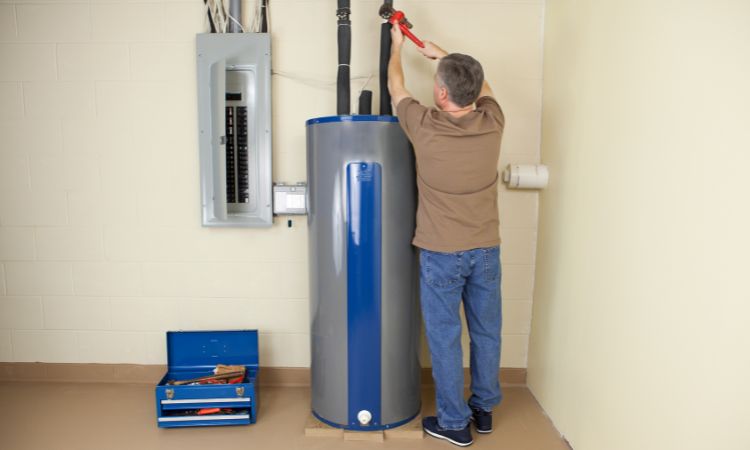Typical Heater Issues Explained
Typical Heater Issues Explained
Blog Article
Every person has got their unique conception about Common Problems with Your Home Water Heater.

Think of starting your day without your regular hot shower. That currently establishes a poor tone for the remainder of your day.
Every home requires a trustworthy water heater, but only a few understand how to handle one. One easy method to keep your hot water heater in top shape is to look for mistakes routinely and also fix them as soon as they appear.
Keep in mind to shut off your water heater prior to sniffing about for mistakes. These are the hot water heater faults you are most likely to encounter.
Water as well hot or as well cold
Every hot water heater has a thermostat that determines exactly how warm the water gets. If the water entering into your home is too hot despite setting a convenient maximum temperature level, your thermostat could be damaged.
On the other hand, also cold water may be due to a failed thermostat, a busted circuit, or incorrect gas flow. For example, if you make use of a gas water heater with a busted pilot burner, you would obtain cold water, even if the thermostat is in excellent condition. For electrical heating units, a blown fuse may be the perpetrator.
Insufficient warm water
Water heaters can be found in numerous dimensions, depending on your hot water needs. If you run out of warm water before everybody has actually had a bathroom, your hot water heater is too little for your family size. You need to consider setting up a bigger hot water heater tank or choosing a tankless hot water heater, which occupies less space as well as is a lot more long lasting.
Weird sounds
There go to the very least 5 sort of sounds you can speak with a hot water heater, however the most typical interpretation is that it's time for the water heater to retire.
Firstly, you should recognize with the typical appears a water heater makes. An electrical heating system may appear various from a gas-powered one.
Popping or banging audios typically mean there is a piece of sediment in your storage tanks, and it's time to clean it out. On the other hand, whistling or hissing noises might simply be your valves letting some pressure off.
Water leakages
Leakages might come from pipelines, water links, valves, or in the worst-case scenario, the container itself. Gradually, water will corrode the container, as well as locate its escape. If this occurs, you require to replace your water heater asap.
However, prior to your change your entire container, be sure that all pipelines remain in location and that each valve functions completely. If you still need help determining a leak, call your plumber.
Rust-colored water
Rust-colored water suggests among your water heater components is rusted. It could be the anode pole, or the tank itself. Your plumber will certainly be able to recognize which it is.
Warm water
No matter exactly how high you established the thermostat, you won't obtain any kind of hot water out of a heating system well past its prime. A water heater's performance may minimize with time.
You will likewise obtain warm water if your pipelines have a cross link. This means that when you turn on a tap, hot water from the heating unit flows in together with regular, cold water. A cross link is simple to spot. If your warm water faucets still pursue closing the hot water heater shutoffs, you have a cross connection.
Discoloured Water
Rust is a major reason for dirty or discoloured water. Corrosion within the water storage tank or a failing anode pole could cause this discolouration. The anode pole shields the storage tank from rusting on the inside and also ought to be checked yearly. Without a rod or a properly functioning anode pole, the hot water quickly rusts inside the container. Contact a specialist water heater technician to figure out if replacing the anode pole will fix the problem; otherwise, replace your water heater.
Final thought
Ideally, your water heater can last one decade before you require a modification. However, after the 10-year mark, you might experience any one of these faults a lot more frequently. At this point, you must include a brand-new hot water heater to your budget.
How To Troubleshoot 3 Common Water Heater Problems in Twin Cities
The Water Heater Is Leaking
A leaky cold water inlet valve A loose pipe fitting A leaky temperature and pressure relief valve A corroded anode rod A cracked tank Turn Off Your Water Heater:
Shut off your gas water heater by turning the gas valve on the unit to the “OFF” position. Shut off your electric water by switching its power off at your electrical panel. Look for a two-pole breaker labeled “water heater” and turn it to the “OFF” position. Move the ball valve connected to the water heater to be perpendicular to the piping at a 90° angle. Look for the Leak:
Depending on whether the water is coming from the tank's top or bottom, you’ll want to look for the leak in different locations.
If the leak comes from the top of the tank, carefully look for water escaping from the cold water inlet valve or loose pipe fittings. Rusted hot and cold water valves can have loose connections with the tank, with water leaking out of them.
https://mspplumbingheatingair.com/blog/how-to-troubleshoot-3-common-water-heater-problems
As a passionate reader about Common Problems with Your Home Water Heater, I imagined sharing that excerpt was mandatory. Sharing is nice. Who knows, you may be helping someone out. Thanks so much for going through it.
Ensure top-quality plumbing repairs. Report this page